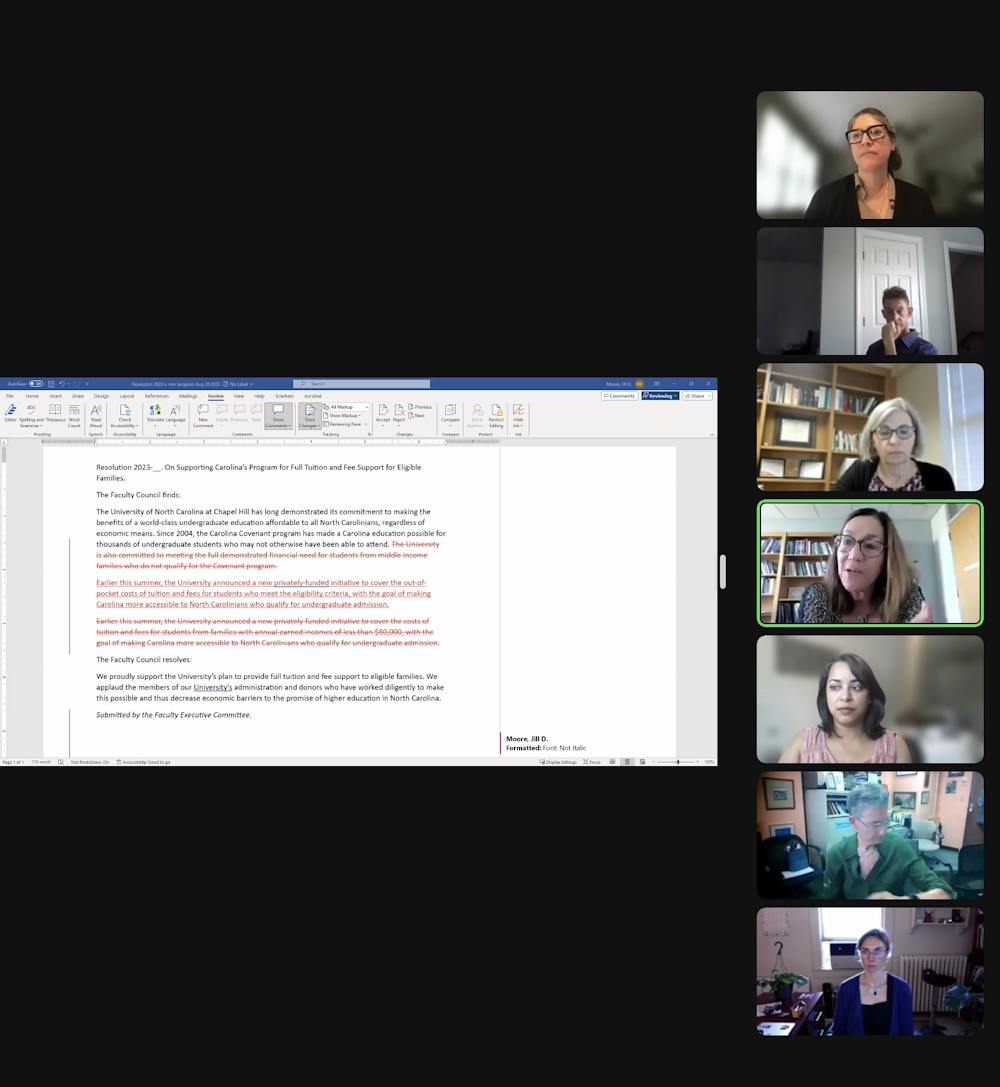During their Monday meeting, the Faculty Executive Committee discussed the University’s new free tuition program starting in the fall of 2024 for eligible undergraduates as well as the potential benefits of releasing a statement in support of the program.
Here’s the rundown.
What’s new?
- The FEC revised a resolution, entitled “On Supporting Carolina’s Program for Full Tuition and Fee Support for Eligible Families.”
- The resolution is meant to show public support for a new program, which was announced in July. The initiative will cover tuition and mandatory fees for in-state undergraduate students whose families make under $80,000 annually and have typical assets.
- Francesca Dillman Carpentier, a professor of journalism and media, said questions came from the Hussman School when the University made the announcement about the tuition program. She said there was confusion around where funding was going to come from and whether or not underpaid staff would continue to be underpaid.
- “I think without knowing all of those kinds of answers or hearing more about how it’s gonna affect other members of the community, I guess I’d be hesitant to put something forward, where we’re essentially giving our implicit support then for other decisions that might then be linked to this,” she said.
- Andy Hessick, a professor at the UNC School of Law, said he was in favor of the program but was not sure how much value a statement in support of the initiative would add.
- “I worry a little bit that some people will see it as a thumb in the eye, or something, because there were some perceived, maybe actual procedural irregularities associated with it,” he said.
- Hessick also said he would like to discuss the criteria for when the FEC decides to issue a statement.
- “There are lots of great things that happen at the University. Why this, why not that,” he said.
- Barbara Entwisle, a professor of sociology, said she leaned toward supporting the resolution because she felt it was important to show support toward the University.
- “In the years that I’ve been on the faculty council, a lot of what we’re doing is implicitly or explicitly criticizing the administration,” she said. “It’s nice to have something to agree with them about and to be supportive.”
- Sue Estroff, a professor of social medicine, said she also wanted to show support for the program.
- “[The program], in many ways, addresses underlying barriers that really need to be addressed. So I would just like to celebrate that we are undaunted and that we will continue to, by any way that we can, keep this the University of all the people,” she said.
- Suchi Mohanty, the head of the Undergraduate Library, said that she too would like to discuss the criteria for issuing resolutions.
- “I also would appreciate a discussion of when and why we issue resolutions, maybe before we go too much further with wordsmithing [the resolution],” she said.
- The FEC also discussed the implications of the tuition program.
- Estroff said she sees the program as the University acknowledging inequalities in a way that is a response to the U.S. Supreme Court ruling against the use of affirmative action in college admissions.
- “This [program], in particular, from my point of view, recognizes structural inequalities, historical inequalities, and access, and is, in some ways, a really crafty, gut punch to the Supreme Court ruling,” she said. “So in that sense, I think it’s worth celebrating, and I think it’s also playing nice with the new Board.”
- Entwisle said she believes the program will help create a more financially diverse applicant pool.
- “The way that it helps is if people feel that they can afford to come, they will apply,” she said.
- In a unanimous vote, the FEC supported submitting the resolution to be voted on in a future faculty council meeting.
- Jill Moore, an associate professor of public law and government, presided over the decision and thus abstained from voting.
What’s Next?
The FEC will meet next on Monday, Oct. 2 from 3:00 p.m. to 5:00 p.m in virtual session.




